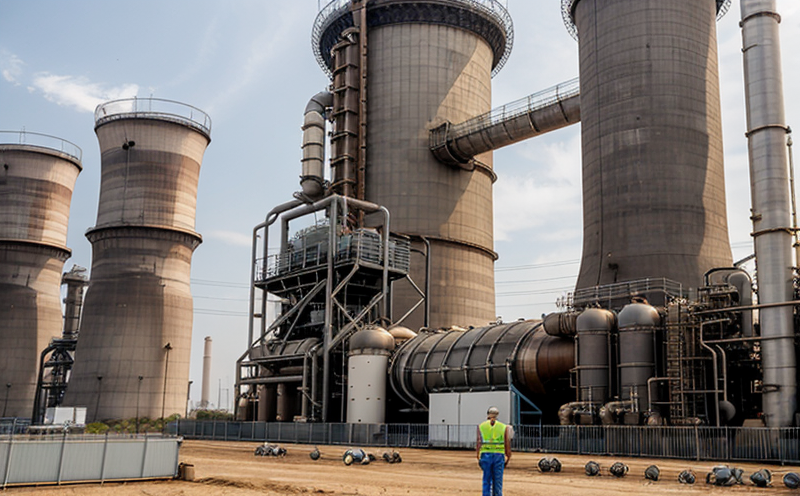Combined cycle power plant inspection
The inspection of combined cycle power plants (CCPPs) is a critical service that ensures reliable and efficient operation. CCPPs are complex systems that consist of both steam turbines and gas turbines, which work together to generate electricity. These plants typically operate at high temperatures and pressures, making them susceptible to wear and tear over time.
Regular inspections are essential for maintaining the integrity of these components and preventing potential failures that could lead to downtime or catastrophic failure. During an inspection, various aspects of the plant are evaluated, including the condition of the turbines, boilers, heat exchangers, and other critical systems.
The primary goal of a combined cycle power plant inspection is to identify any issues before they escalate into larger problems. This proactive approach helps in minimizing maintenance costs, ensuring compliance with regulatory requirements, and extending the life span of the equipment. The inspection process involves several key components:
- Visual Inspection: This includes a thorough examination of visible areas of the plant for signs of wear, corrosion, or other anomalies.
- Instrumentation Checks: Various sensors and instruments are checked to ensure they are functioning correctly. This includes pressure gauges, temperature sensors, and flow meters.
- Material Testing: Samples from critical components may be taken for metallographic analysis or other tests to assess their condition and remaining useful life.
- Diagnostics: Advanced diagnostic tools are used to evaluate the performance of various systems within the plant. This can include acoustic emission testing, ultrasound scanning, and other non-destructive evaluation techniques.
The inspection process is typically carried out by qualified personnel who have extensive experience in power generation systems. They use a combination of visual assessment, diagnostic tools, and material analysis to ensure that all parts of the plant are operating within acceptable parameters.
By conducting regular inspections, operators can catch potential issues early on, allowing for targeted repairs or replacements before they become major problems. This not only improves safety but also enhances overall efficiency and reduces operational costs in the long run.
The importance of combined cycle power plant inspection cannot be overstated. It plays a vital role in ensuring compliance with environmental regulations, enhancing operational reliability, reducing unplanned outages, and maximizing asset utilization. Proper maintenance and inspection schedules are crucial for maintaining optimal performance while minimizing risks associated with aging infrastructure.
Benefits
The benefits of regular combined cycle power plant inspections are numerous. Firstly, it enhances operational reliability by identifying potential issues early, thereby preventing costly repairs or replacements during unscheduled downtime. Secondly, compliance with environmental regulations is ensured through consistent adherence to established standards and best practices.
- Reduces Downtime: Early detection of problems helps in scheduling planned maintenance rather than facing unexpected outages.
- Safeguards Against Failures: Preventive measures implemented during inspections help avoid catastrophic failures that could disrupt operations and endanger personnel safety.
- Improves Efficiency: By maintaining optimal performance levels, the plant operates more efficiently leading to lower fuel consumption and reduced emissions.
- Extends Equipment Life: Regular maintenance based on inspection findings can significantly extend the useful life of various components within the plant.
In addition to these direct benefits, combined cycle power plant inspections also contribute positively to corporate sustainability goals by promoting responsible resource use and minimizing environmental impact. This aligns with global trends towards greener energy solutions and sustainable business practices.
Eurolab Advantages
EuroLab offers unparalleled expertise in the field of combined cycle power plant inspection, leveraging state-of-the-art technology and experienced personnel to deliver top-notch services. Our team comprises certified professionals with deep knowledge of power generation systems, ensuring accurate diagnosis and effective recommendations.
- Comprehensive Knowledge: With years of experience in this sector, our inspectors are well-versed in both theoretical principles and practical applications relevant to combined cycle power plants.
- Advanced Technology: Utilizing cutting-edge diagnostic tools allows us to uncover hidden defects that might otherwise go unnoticed, providing more comprehensive evaluations.
- Comprehensive Reporting: Detailed reports are provided following each inspection, offering clear insights into the condition of all relevant components and suggesting appropriate courses of action.
- Regulatory Compliance: Ensuring compliance with international standards such as ISO 9712 and ASME codes guarantees that our services meet the highest quality assurance benchmarks.
In summary, EuroLab’s commitment to excellence in combined cycle power plant inspections sets us apart from competitors. Our dedication to providing accurate assessments, reliable recommendations, and comprehensive support ensures that clients receive optimal value for their investment in this critical service.
Quality and Reliability Assurance
The quality and reliability of EuroLab’s combined cycle power plant inspection services are underpinned by stringent internal controls and adherence to best practices. Our rigorous processes aim to deliver consistent, high-quality results every time.
- Certified Personnel: All inspectors undergo thorough training and certification programs to ensure they possess the necessary skills and knowledge.
- Advanced Equipment: State-of-the-art diagnostic tools are employed to provide precise measurements and detailed insights into the condition of plant components.
- Standardized Procedures: A set of standardized procedures guides each inspection, ensuring consistency across all projects.
- Continuous Improvement: Regular feedback loops allow us to continuously refine our methods based on latest industry trends and technological advancements.
We employ a multi-disciplinary approach combining engineering expertise with advanced analytics to deliver robust solutions. This ensures that every aspect of the plant receives thorough scrutiny, resulting in reliable outcomes capable of supporting long-term strategic planning for power generation companies.





